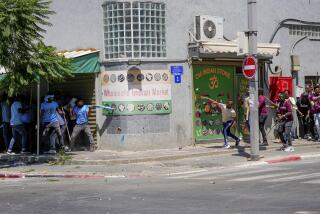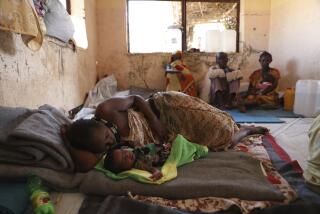Eritrea Denies Charges of Detaining Ethiopians
- Share via
ASMARA, Eritrea — The government acknowledged Monday that some Ethiopian residents had been moved or had voluntarily relocated to several camps, but it denied charges by the Ethiopian government that they had been rounded up and were being detained.
Wondimu Degefa, an attache at the Ethiopian Embassy in Asmara, the Eritrean capital, said 7,489 Ethiopians had been snatched from four Eritrean towns--Mendefera, Dekemehare, Keren and Massawa--beginning May 29 and deposited at various sites across the country.
“They abducted these people and took most of them to unknown places,” said Wondimu, who claimed that the camps were short on food, water and proper sanitation.
The accusations came as mediators continued talks in Algiers aimed at ending the 2-year-old war between Ethiopia and Eritrea. They cast a shadow over Eritrea’s claims that it has continued to treat fairly Ethiopians living on its territory despite the fact that thousands of its own citizens have been deported from Ethiopia.
Eritrean government officials dismissed the charges as propaganda.
“That’s totally false,” said Tesfai Ghermazien, a permanent secretary in Eritrea’s Ministry of Foreign Affairs. “There are no concentration camps now. Like 1.5 million Eritreans, [the Ethiopians] are displaced.”
He added that to his knowledge, “no Ethiopians had been rounded up from Massawa or from any other place.”
Eritrean government spokesman Yemane Gebremeskel said detaining Ethiopian residents would be illegal and against Eritrean policy.
“There was a parliamentary bill passed two years ago that says Ethiopians have a right to live here,” Yemane said. “You simply can’t go out there and collect them.”
A foreign aid worker based in Asmara said claims of forced detentions were being “treated as allegations” by international relief agencies until proven otherwise.
At a site in Sheketi, about 18 miles outside Asmara, scores of women and children sat in a row Monday in the middle of a field under a blazing sun. Other civilians were under the shade of huge trees, while dozens more dotted the parched slopes nearby. Wondimu, the Ethiopian diplomat, said more than 1,700 civilians had been moved to Sheketi from Mendefera.
Military guards and civilians from a nearby village confirmed that the civilians in the field were Ethiopians, but reporters visiting the camp were told that they would need special permission from the local authorities to speak to those in the camp. In general, access to camps sheltering Eritreans has been open to journalists.
Tesfai, the Eritrean Foreign Ministry official, said Ethiopians living at sites such as Sheketi had been taken there for their own benefit.
“They can’t take care of themselves, so we, the government, are taking care of them,” Tesfai said. “They are displaced from their dwellings, and they are in areas where they can be kept safely. They are not camps.”
Wondimu claimed that 79 Ethiopians living in Eritrea had been killed by civilians since May 12, that hundreds had been arrested and that scores of Ethiopians were being held in the basement of an Asmara movie theater.
The smell of human waste seeped out of the cinema building in a predominantly Ethiopian neighborhood, but there was no visible sign of people inside. Soldiers guarding the building said the cinema had been converted into a police station.
Yemane, the Eritrean government spokesman, said that more than 40,000 Ethiopians were still living in Asmara and that many own shops and businesses.
“Nobody has been evicted due to his nationality,” Yemane said, adding that people who wanted to leave were free to do so, as long as they registered their departure with the International Committee of the Red Cross.
Wondimu charged that Eritrean security officers followed him each time he left the Ethiopian Embassy compound and that he had twice been temporarily detained.
Yemane said the government in the Ethiopian capital, Addis Ababa, was employing similar tactics and that the Eritrean attache there was under constant surveillance. He charged that Eritreans living in Ethiopia had been evicted from public schools, fired from their jobs and denied medical care in state hospitals. About 70,000 Eritreans have been deported from Ethiopia since fighting began.
More to Read
Sign up for Essential California
The most important California stories and recommendations in your inbox every morning.
You may occasionally receive promotional content from the Los Angeles Times.














